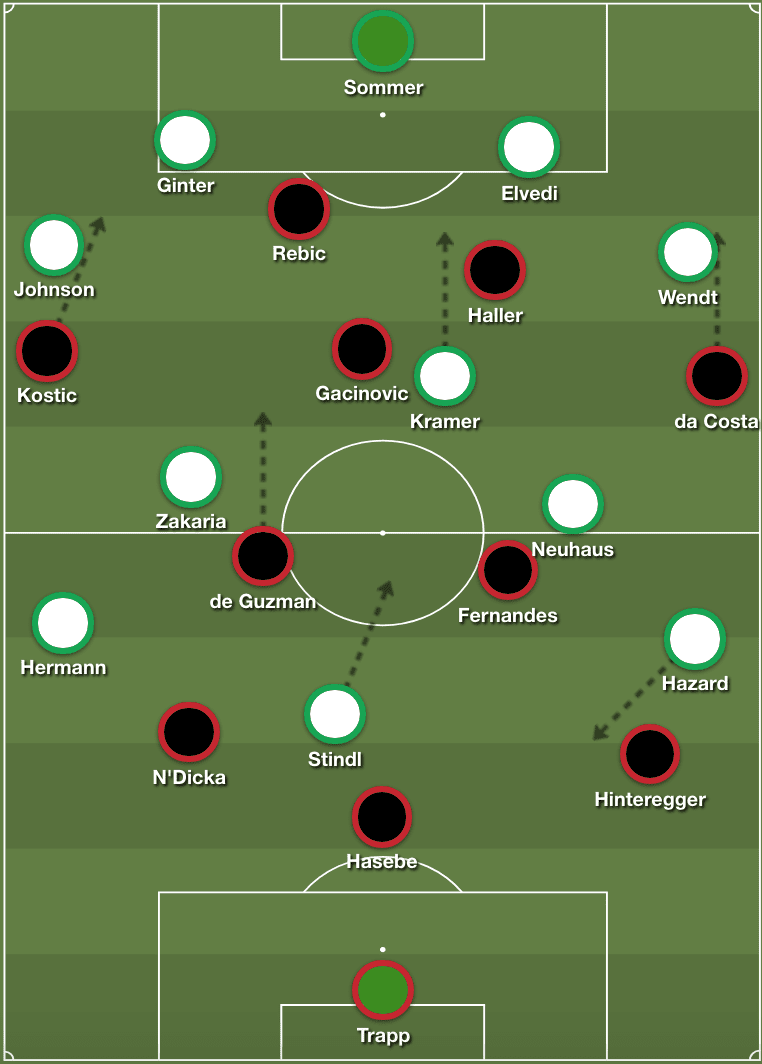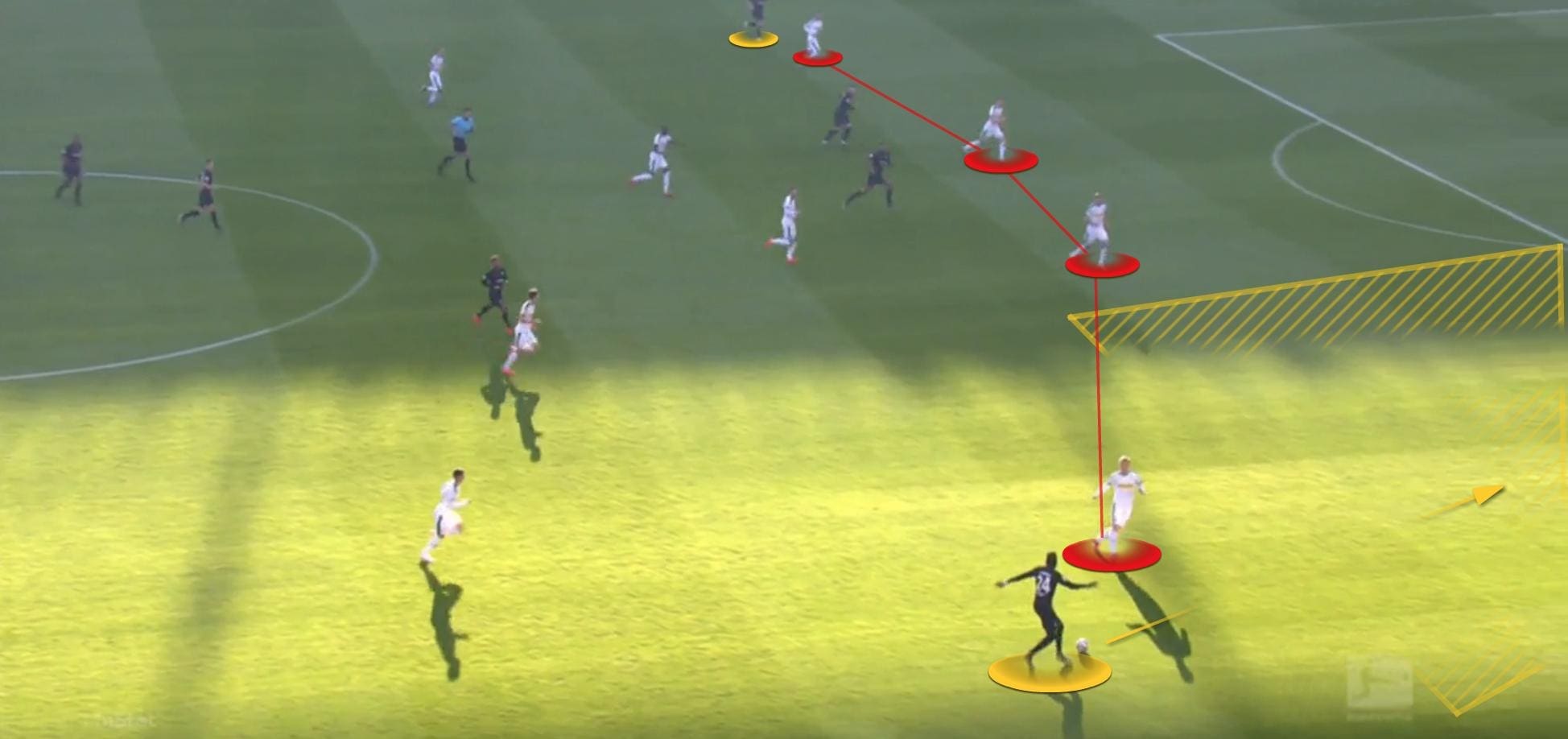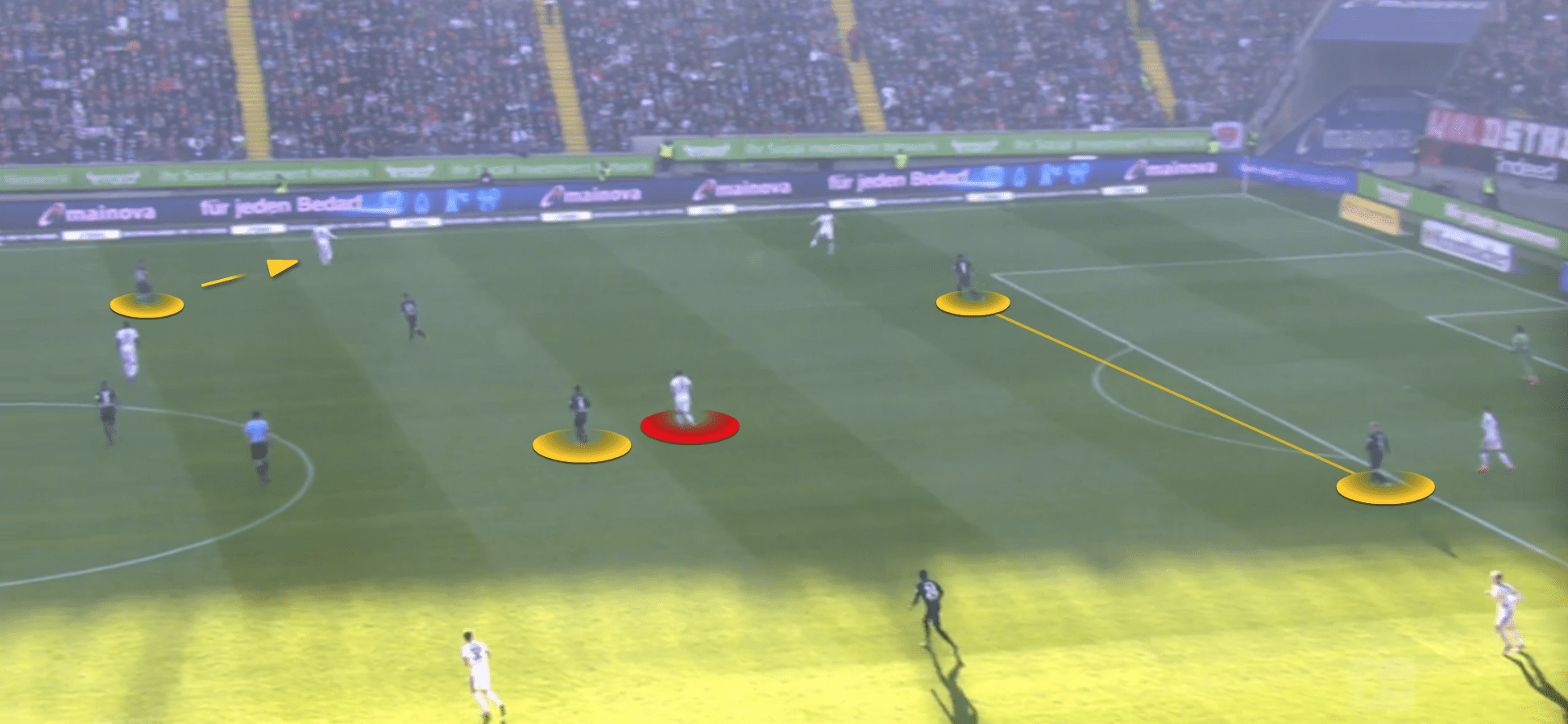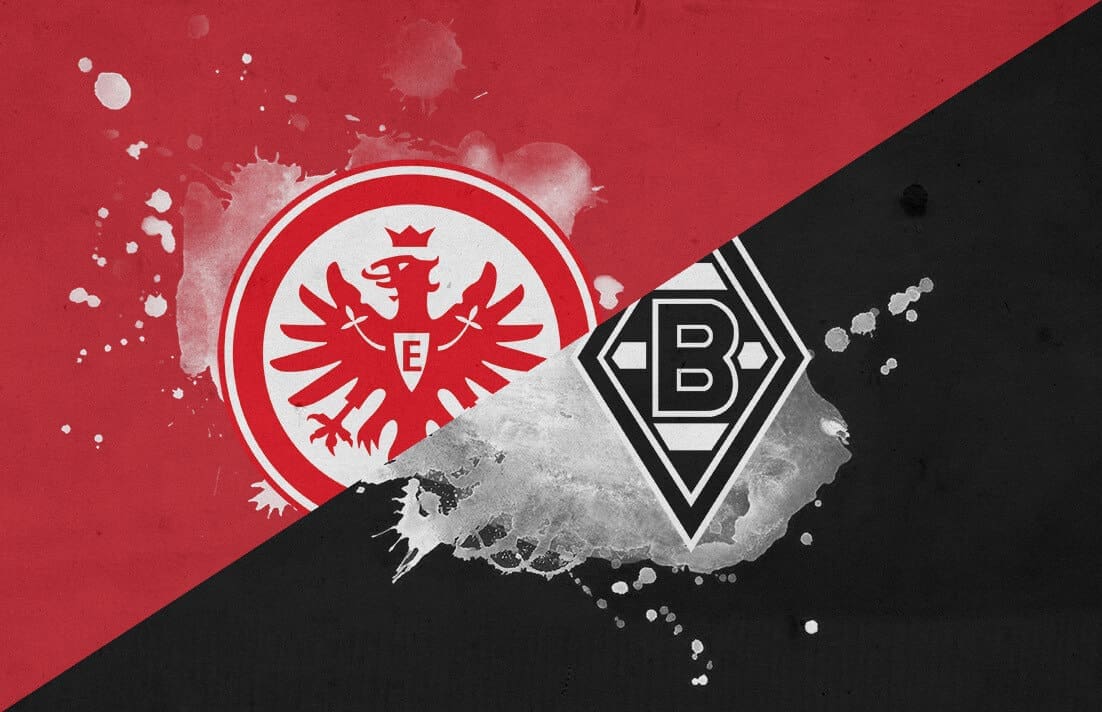Heading into Sunday’s match, it would’ve taken a brave man to place a bet on who would come up on top between Eintracht Frankfurt and Borussia Monchengladbach. Despite the latter’s place in the table and Frankfurt’s inability in recent matches to gain all three points in the league, the home side possess a number of lethal players in attacking positions, capable of creating issues for any side in the Bundesliga. While both teams are conflicting in terms of their tactical ethos, it promised to be an incredibly intense battle between two of the premier sides in the division.
Lineups

Frankfurt manager Adi Hütter made the somewhat surprising decision to drop star striker and rumoured Barcelona target Luka Jovic to the bench. Instead, he opted to have Sebastian Haller and Ante Rebic lead the line in Die Adler’s 3-5-2 formation. In this shape, wingers Danny da Costa on the right and Filip Kostic on the other side were given license to bomb forward and provide service to the two forwards.
Much of the onus in possession lay on Makoto Hasebe, a converted defensive midfielder, and his skill in driving forward to probe and create openings in Gladbach’s armour. Gacinovic held the responsibility as the number 10 in linking play from midfield to his teammates operating in the final third.
Gladbach, on the other hand, had their own wrinkle with regards to team selection as top scorer Alassane Plea only started on the bench. The Gladbach attack still possessed notable quality through Lars Stindl’s ability to drop deep and link up play, as well as the dribbling expertise of Liverpool transfer target Thorgan Hazard. Full-backs Fabian Johnson and Oscar Wendt, known more for their skill going forward than without the ball, would be key in a Borussia attack focused intently on utilising width and direct play.
An energetic first half of parity
The beginning of the match was marked with very quick attacking play from both sides. Whenever possession was won the focus was on taking advantage of the opposition’s disorganisation. As noted previously, da Costa and Kostic were constantly on the front foot, looking to receive possession wide on the touchline to beat players one-on-one, or to be slipped in behind the defence.
The catalyst for much of Eintracht’s passing play came from defender Makoto Hasebe stepping out with the ball and playing from there. Borussia’s attacking play was marked by comparative verticality, looking to break lines with passes and run at the heart of the Frankfurt defence. Because of this focus on attacking play early on, the first 20 minutes were decidedly sloppy.

When both teams did have sustained periods of possession, the team without the ball operated in quite different patterns of defensive organisation. Borussia sat off in a 4-5-1, setting their line of confrontation at the half-way line. Occasionally a sloppy pass would trigger a higher press to try and take advantage, but compared to Frankfurt it was relatively low key.
Frankfurt manager Adi Hütter opted for an extremely high defensive line, something that has been a hallmark of theirs this season. The two strikers Haller and Rebic parked themselves on top of Borussia’s defenders Ginter and Elvedi, while Kramer (who often came deep to try and build the play) was constantly marked by Mijat Gacinovic. Because of this lack of central passing options, Gladbach tried to move the ball through their full-backs but they were often jumped upon quickly.

In terms of true goalscoring chances, both teams were largely unable to generate anything other than a few corners, free kicks and tame efforts on goal. However, it would be Frankfurt to break the deadlock right on halftime with a goal which reflected the somewhat helter-skelter nature of the match.
After getting a corner in the dying minutes, a half-blocked shot from the edge of the area fell to da Costa in the six-yard box and he lashed home. Gladbach could be forgiven for thinking that going into the break tied would have been a more just scoreline, and they would have been right.
Another half of equality
Taking the team’s style of play out of the equation, and in a match which had spent so much of the first half played without a handbrake, somewhat surprisingly the second stanza was similarly quick and frenetic. There were some notable exceptions, however. For Gladbach, the late goal in the first half forced the away side to become even more direct in their approach.
Borussia are normally a side which attempts to build-up play from goal kicks and from the back; this shifted ever so slightly. The substitutions of Plea and Josip Drmic gave them more of an ability to hit balls into the channels, or use the two strikers to win knockdowns from headers and other duels higher up the pitch.
While Lars Stindl was not at fault in any sense for his performance, he is more suited to operating with runners coming off him. This particular match had no need for such a striker. Frankfurt continued their usual modus operandi of intense pressure high up the pitch but did so in a more considered approach. It would have been unwise of the home side to try and play at such intensity for the full 90 minutes.
Instead, they picked and chose their moments more often than not. Their attacking approach became more heavily focused on balls into the channels for their two strikers to run onto, hold up, and bring the rest of the team forward.

As in the first half, the equalising goal for Gladbach came from close to nowhere. In a relative lull in the match, the recently subbed on Tobi Strobl found Denis Zakaria between the lines with a superb pass from deep. The Swiss midfielder brilliantly turned, found himself space on the edge of the box and smashed home.
Bringing the scoreline at 1-1, the goal was no less than Gladbach warranted. With only minutes remaining in the match, both teams seemed happy with gaining a well-fought point. Frankfurt and Gladbach proved unable to dominate the match for any extended spells, so all was fair.
Conclusion
Eintracht Frankfurt and Borussia Monchengladbach played out an extremely engrossing tactical battle on Sunday as two conflicting styles of play come to a head. In what would prove to be a fast-paced, evenhanded encounter, both the sides could argue little that a draw was a fair reflection of proceedings.
Frankfurt focused much of their play on heavy pressing and width in attack, while Gladbach leaned towards their traditional approach of slick passing and verticality through the centre. Much of the match was sloppy and admittedly lacked true quality, but this clash of styles led to an engrossing tactical battle between managers Adi Hütter and Dieter Hecking.
Going forward the rest of the season, Gladbach should remain confident that they can keep touch with the Bundesliga’s very top sides. Despite their propensity for drawing matches, Frankfurt should also be relatively upbeat that they can start picking up more points and perhaps finish in the division’s top four.
If you love tactical analysis, then you’ll love the digital magazines from totalfootballanalysis.com – a guaranteed 100+ pages of pure tactical analysis covering topics from the Premier League, Serie A, La Liga, Bundesliga and many, many more. Buy your copy of the February issue for just ₤4.99 here, or even better sign up for a ₤50 annual membership (12 monthly issues plus the annual review) right here.





Comments